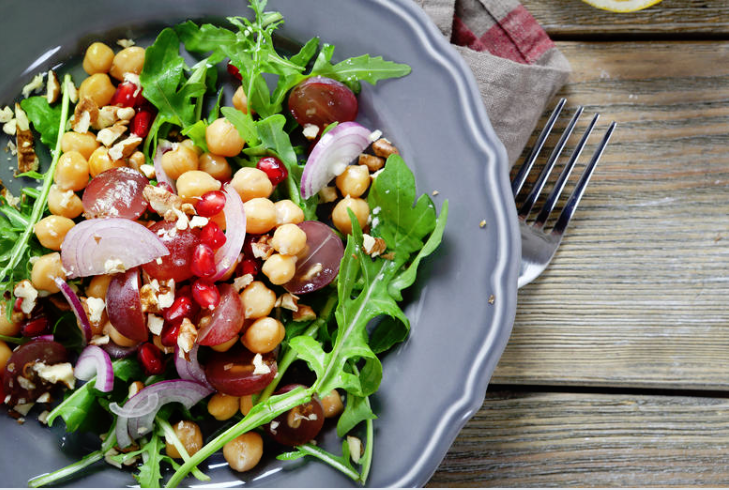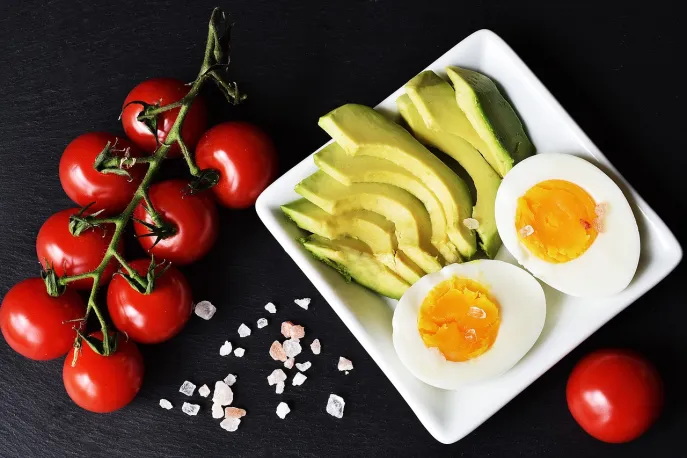After the popularity of my first blog post on eating for PCOS (which you can find right here), I thought it was time I expand on it and deep-dive into the nitty-gritty details of nutrition management in PCOS.
If you’d like to know more about what this acronym stands for, who it affects and the symptoms to look out for, then PLEASE go read my first blog post on this topic before getting back to this one, it’ll make a lot more sense for you too!
Right now, it seems like there’s lots of information (and therefore misinformation) floating around online and in the social media world about nutritional management of PCOS. Women with a medical condition like PCOS, are a vulnerable group and should be protected from a lot of nutrition nonsense that is telling them to cut this food or in some cases multiple food groups out to manage.
This blog is to serve as a bit of an update based on my reading, training and working with clients to get into some of the details of PCOS and management and busting some of these myths too!
(1) Legumes
You may have listened to my podcast with PCOS and Nutrition talking about why plants are so important in the management of PCOS (if you haven’t you can listen to it here). In particular, I talk a lot about why a diet rich in legumes, pulses, beans and lentils is particularly beneficial for PCOS (FYI, it’s a good idea to eat more of these for general health too).
Legumes are packed with soluble fibre, magnesium, zinc, plant-based iron, B vitamins and so much more! Legumes, especially chickpeas and soy foods too, are rich in a particular phytoestrogen called genistein. Genistein supplements have been researched in women with PCOS (146 Iranian women, Khani et al., 2011) and showed an improvement in cholesterol levels and a reduction in testosterone, which is often a contributor to some of those symptoms we see like acne, excessive hair growth or hair losses.
Applying this to your diet, incorporating lots of legumes and beans, especially chickpeas which are particularly rich in genistein, can be an important way to help manage PCOS from a hormone and metabolic perspective as well as incorporate more plants into our day-to-day lives.
Another study of 100 women with PCOS showed a diet rich in legumes as part of a style of diet called “anti-inflammatory dietary combo”, which also contained fish and a reduction of intake of red meat and chicken, combined with exercise and low glycaemic index eating principles showed very favourable results. Including improvements in hormone levels, metabolic parameters and weight. And bonus, 12 women fell pregnant spontaneously during the 12-week study and another bonus 63% regained menstrual regularity! (Salama et al., 2015).
The other benefit of a diet rich in fibre from foods like legumes and beans, is that it helps to feed our gut microbiota which do play a role in mental health. Mood disorders are a feature of the syndrome of PCOS, and increasing prebiotic fibre that feeds the gut-loving bugs in our intestines should be prioritised.
Practical tip: use canned legumes and rinse thoroughly to reduce the gas/bloating effect of legumes. Try incorporating hummus on veggies or crackers, roasted chickpeas for a snack, make a bean-based Mexican dish, try making a traditional lentil soup or dhaal to help boost your legume intake. Or, if you’re dipping your toe in the water, try mixing half your mince meat with lentils in dishes like spaghetti bolognese or lasagne, or simple baked beans on toast for brekkie.
(2) Antioxidant-rich diet
Antioxidants have also been a researched area in PCOS management. Antioxidants are the naturally occurring compounds found in plants that they use to fight off pests and disease, funnily enough, they also play a similar role in managing inflammation and exerting anti-disease effects in our bodies when consumed.
A review of the literature has shown that particular features of PCOS increase oxidative stress such as excess weight, high levels of androgens and insulin resistance, which antioxidants can help tackle. Other studies also have highlighted a reduction in the circulating antioxidant and other vitamins in women with PCOS (Amini et al., 2015).
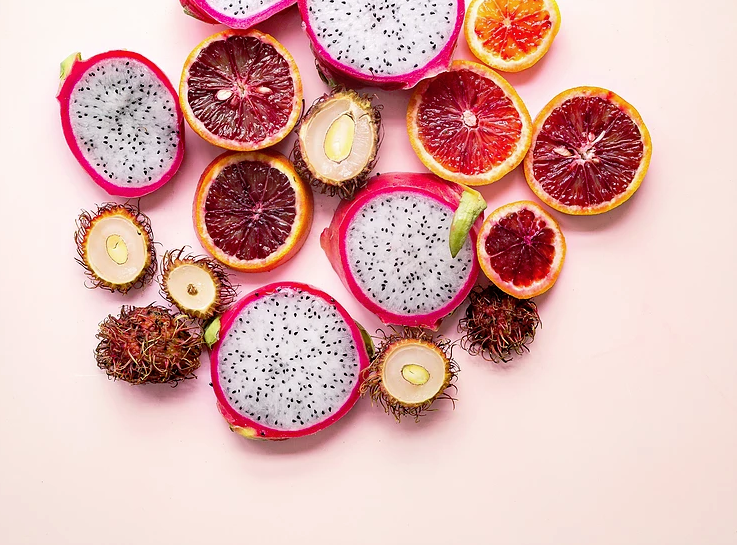
One randomised controlled study has shown improvements in hormone levels like total testosterone and DHEAS as well as improvements in insulin sensitivity after a trial of resveratrol supplements (Banaszewska, et al., 2016). The group was small (30 women with PCOS), however, in 3 months to achieve some changes in both metabolic and hormone domains of the condition is promising and highlights the need for dietary recommendations to focus on antioxidant-rich foods.
Practical tips: Be sure to include a wide variety of colourful fruit and vegetables, especially berries, grapes and dark purple coloured veggies like beetroot, purple cabbage, eggplant to get a good hit of antioxidants into your day!
(3) Omega-3s
You have probably heard me harp on about omega-3 fatty acids before and how amazing they are for heart health, fertility, pregnancy and general wellbeing (if not you can read more about it here).
A recent systematic review of omega-3s for PCOS found 9 trials involving nearly 600 patients which showed that omega-3 fatty acids improved insulin responses, lipid profiles and increased adiponectin levels (Yang et al., 2018). Adiponectin is a hormone involved in regulating blood glucose levels as well as fatty acid breakdown.
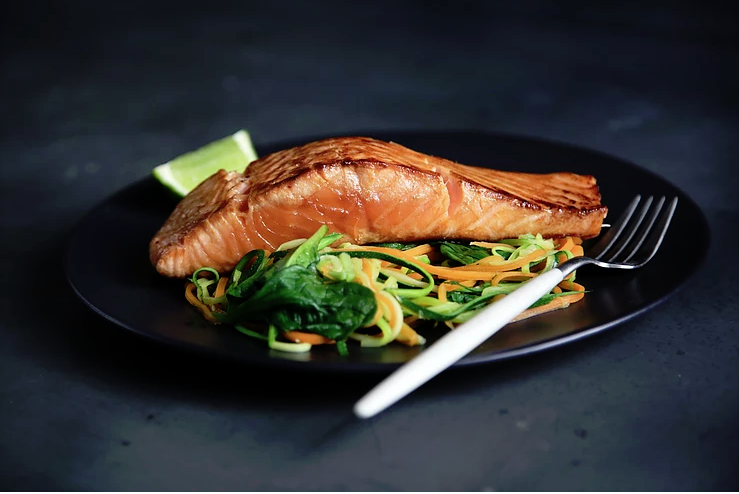
Of course, first optimising the diet for omega-3 fats wherever possible from oily fish like salmon, fresh tuna or sardines at least twice a week and plant-based sources like walnuts, chia seeds, hemp seeds should be prioritised. In women with PCOS with high cholesterol levels or issues with insulin resistance it may be worth considering omega-3 supplementation as part of your routine.
Practical Tip: Not all tinned fish is made equal when it comes to the omega-3 stakes, check the back of the tin for omega-3 content and compare per 100 g to ensure your canned fish meals are adding up to help optimise your intake.
(4) Inositol
Research continues to mount on the benefits of inositol to help manage PCOS, especially when trying to conceive. Whilst guidelines still acknowledge supplementation of inositol as “experimental”, the popularity of this product continues to rise amongst the PCOS population.
Inositol is a B-vitamin like nutrient found in berries, beans and nuts, which helps in the utilisation of insulin and glucose in the body, which is often at play in women with PCOS, especially those with insulin resistance. It has been shown that the level of two key types of inositol, namely Myo-inositol and D-chiro inositol can be unbalanced in different parts of the body in women with PCOS, notably in the ovaries.
Read more about taking inositol in PCOS in my blog post.

The balance of Myo-inositol to D-chiro inositol is important and has been studied at a 40:1 ratio which has shown optimal results. This was in a group of 46 women with PCOS who were overweight and had insulin resistance revealed improvements in hormones, including free testosterone and also fasting insulin levels (Benelli et al., 2016). Notably, no side effects were recorded in this study as it one of the first to combine the two. There have been enough studies to conduct a review on this topic which have deemed it a safe and effective therapy for PCOS, helping to enhance follicle (egg) development and maturation and therefore also help with fertility and pregnancy outcomes (Unfer et al., 2016).
Practical tip: Speak to your doctor and dietitian before starting any supplements to ensure they are right for you. If you do decide to start a Myo-inositol & D-chiro inositol supplement ensure it is in the correct ratio (40:1), that is 40 times more Myo than D-chiro.
(5) Myth: “Free from” diets – gluten, dairy, soy
I commonly hear from my clients, that they have cut out gluten, dairy, soy or sugar out completely (often this is much harder than it seems) leaving them very little convenient options and also compromising their fibre and calcium status. Often these restrictions are unnecessary (i.e. there’s no medical indication like Coeliac disease, lactose intolerance or other intolerances). Let’s get into the facts.
Dairy – milk is a product of lactation and of course, contains naturally occurring hormones and given PCOS is a hormonal condition, many women are concerned about the implications. The evidence is currently inconclusive either way. A 2013 study of 400 Iranian women of which 40 had PCOS and showed that dairy consumption had no significant effect on PCOS (Rajaeieh, et al., 2014). Dairy can exacerbate acne so a trial of dairy free for acne management in PCOS may be an option (Burris et al., 2013), however, calcium from alternatives needs to be prioritised for healthy bones.
Why women need to prioritise bone health – read more.
Soy – I’ve spoken about soy and all its controversies at length on my blog (you can read that here), it seems to be one of the most feared foods especially amongst the women’s health/fertility community. In fact, soy has been touted for its heart health benefits, helping to improve insulin resistance and even evidence showing its link to better IVF outcomes in infertile women (Vanegas et al., 2015).

Gluten – the protein found in wheat, rye, barley and oats (here in Australia), has been a popular victim in the diet world and also the alternative medicine world. There’s no evidence of any benefit (or harm) in women with PCOS of this dietary pattern, it usually sees some improvements because a gluten-free diet often does not replace all gluten-containing grains for gluten-free alternatives, therefore, lowering the carbohydrate intake overall.
The downside is you’re potentially losing out on social eating, easy nutritious and fibrous options and many gluten-free alternatives to your favourite foods contain less nutrition and more energy (either fats or sugars) to make it taste good. On the whole, I would not recommend it with the current state of evidence for women with PCOS.
(6) Myth: Keto Diet
The ketogenic diet (fondly known as keto) has been studied in women with PCOS, in a small group of 11 women. They were instructed to consume less than 20 grams of carbohydrate each day (equivalent to 1/2 cup of rice per day). In this 24 week study, the dietary pattern did show improvements in hormonal parameters, weight, testosterone and insulin levels, however 6 women dropped out due to an inability to comply with this diet (Mavropoulos, et al., 2005).
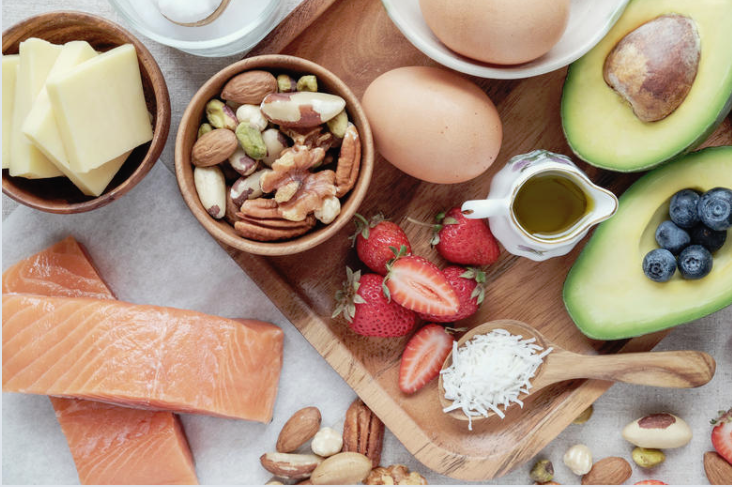
With professional support, this may be an option to help manage PCOS, however, the sustainability and suitability of this dietary pattern must be carefully considered combined with a health check with your physician and working with a dietitian to maintain nutritional adequacy. More studies will be needed before we can decide whether this is the best strategy for management, as, at this time, there is no one pattern that works for everyone.
Practical tip: speak to your dietitian and doctor before attempting a very low carbohydrate diet to see if this is right for you!
Need help managing PCOS through good nutrition principles that you can easily maintain without the stress? Take control of your PCOS rather than letting it take control of you!
Introducing…The PCOS Project
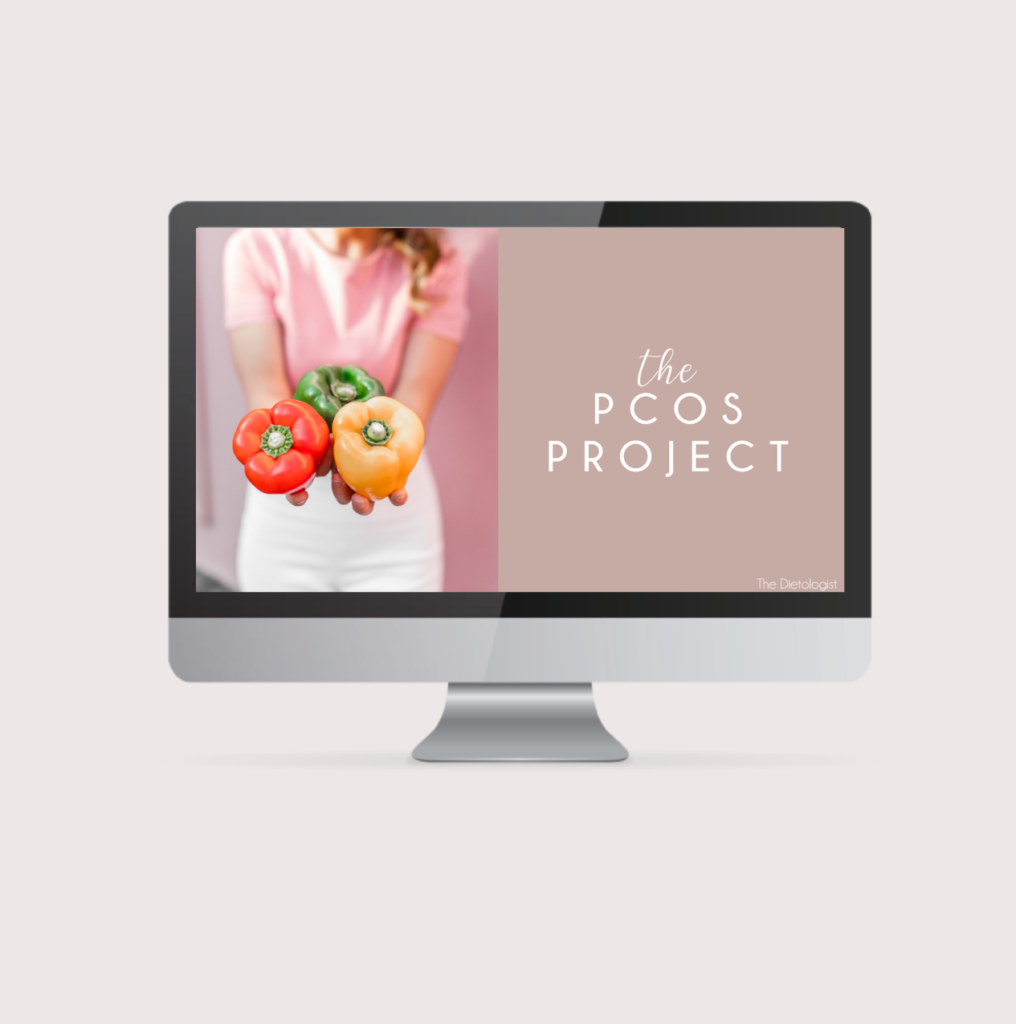
This self-paced online course has been developed to highlight the role of diet and nutrition in managing your PCOS symptoms and taking control of the rollercoaster that is PCOS with 10 comprehensive PCOS-specific nutrition lessons. We also include BONUS PCOS-friendly 7-day meal plans and recipes! Check it out ?
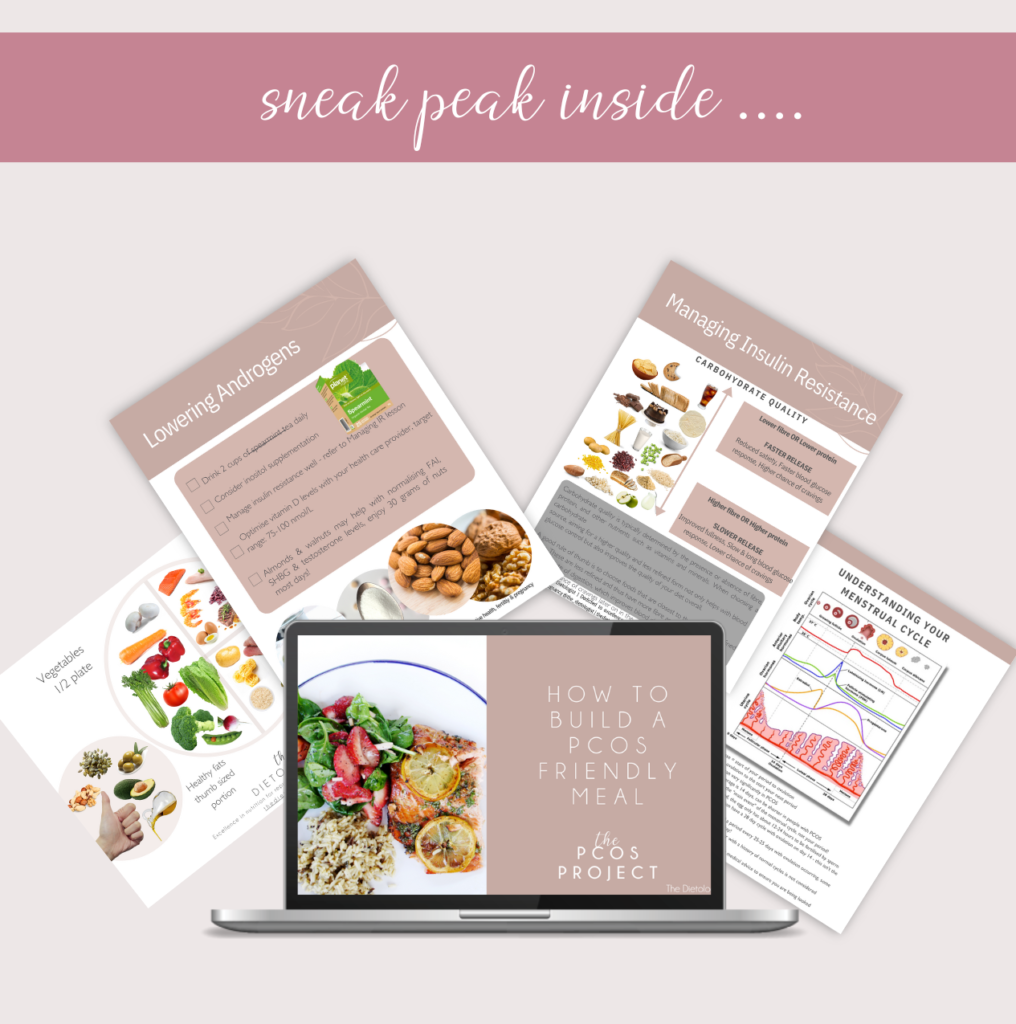
What you’ll get inside The PCOS Project:
- Over 10 comprehensive PCOS-specific nutrition lessons designed & delivered by expert reproductive health dietitian & nutritionist
- Learn exactly what bloodwork you need to monitor your PCOS today and in the long-term too!
- Take control of insulin resistance and stubborn weight using the insulin resistance lesson & comprehensive workbook
- Our strategies to lower androgens driving those pesky pimples & chin hairs!
- Understand your menstrual cycle, the ways you can track it, what the “red flags” are for more help and how to nourish yourself for more regular periods!
- PLUS: supplementation considerations for PCOS (note: does not include personalised supplementary advice), mood & food for mental health, anti-inflammatory eating for PCOS, optimising gut health & how to build a PCOS-friendly meal
BONUS: PCOS-friendly done-for-you 7-day meal plans with recipes AND additional recipe resources!
You will get 2 YEARS to access this incredible VAULT of expertly crafted & delivered PCOS education.

